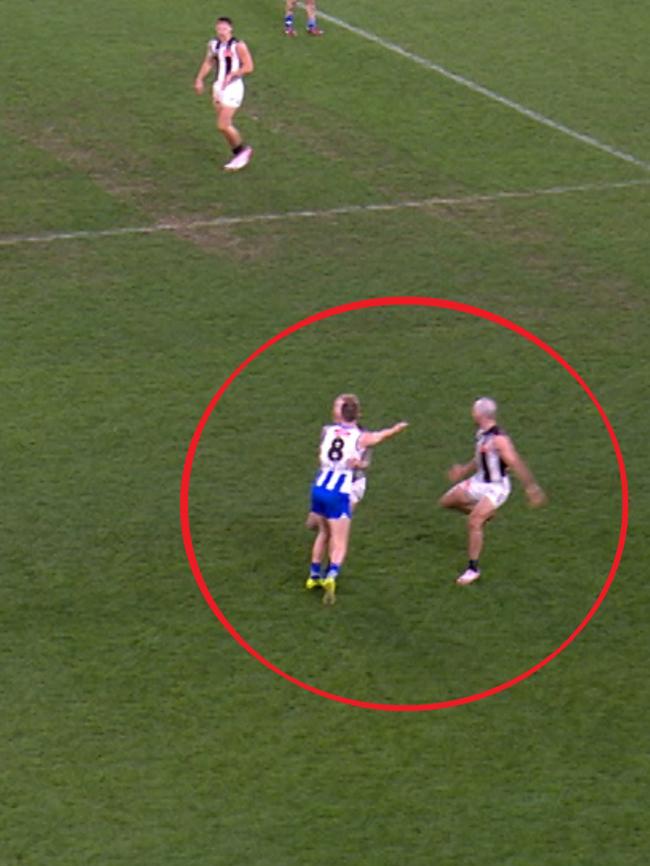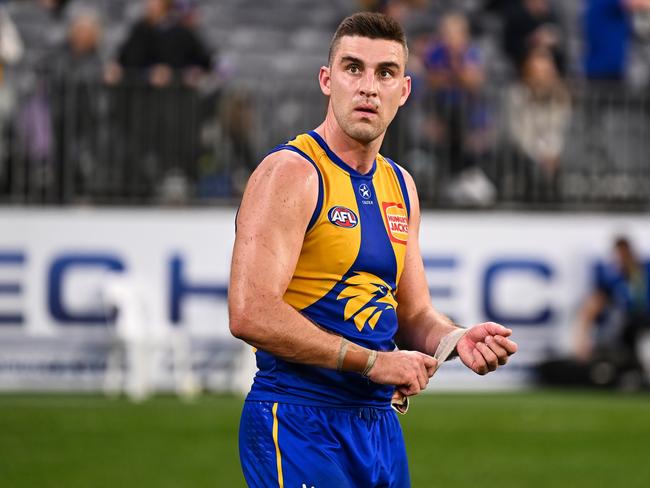Mark Robinson on the state of AFL umpiring in 2024 after the Bailey Scott decision
In nearly 30 years of covering footy, the umpiring has never been more in disarray, writes MARK ROBINSON. The AFL has a problem – and it cannot be ignored.
AFL
Don't miss out on the headlines from AFL. Followed categories will be added to My News.
Footy used to be decided by skill. It’s now being decided by interpretation and missed calls.
The decision not to pay a 50m penalty to North Melbourne’s Bailey Scott was the worst decision of the season. It polluted a cracking game of Australian Rules, one which should be talked about for being pure, thrilling and high-scoring, but instead the commentary surrounds a series of mysterious non-calls that decided the result.
In nearly 30 years of covering footy, the umpiring has never been more in disarray.
It’s not in anyone’s best interests to bash the umpires because, well, they’re just doing their best. But as BT likes to say, boy oh boy, wowee.
It’s not all their fault, mind you.
The game is frantic and complicated; the players are deft and sneaky with illegal ball distribution; the holding the ball interpretation was changed mid-season; the mass congregation of players around the ball means umpires are often blindsided; and, in some cases, the umpires are too scared to blow the whistle for fear of making a mistake.
The umpires will deny that last one. But how else can you explain the series of missed free kicks in the final minute of the North Melbourne-Collingwood game?


The non-penalty against Steele Sidebottom and Beau McCreery was outrageous. There’s too much at stake to simply say a mistake was made.
Why wasn’t it paid? The controlling umpire missed it, but what about the other three umpires? Couldn’t one of them have taken control? Or did they all freeze as well?
On Friday night, St Kilda’s Marcus Windhager was penalised 50m for running from behind the play to stand the mark. And we’ve seen other players put a big toe over the mark this season and be penalised and waved back 50m.
But on Sunday, the two Collingwood blokes lost their heads and charged over the mark at Scott. They were confused and Scott was confused. And so, too, were the umpires.
The Nick Daicos missed call was half-understandable. He was tackled – who knows if he had prior opportunity – he tried to handball. The ball fell out. Play-on was called.
The Isaac Quaynor missed call was clearly wrong. Because the game has allowed players – over many years – to squirt the ball over their left and right shoulders, by swinging in unison the cradled hand with the clenched fist, it’s almost impossible to determine if the ball is thrown or a handballed.
The umpire assumed Quaynor handballed it. In real time, it looked iffy. The replay showed it was a throw.
All up, there was one certain free kick and one maybe in 40 seconds of craziness. And the Quaynor, decision 10 minutes earlier, was also wrong.
No one with footy in their soul can believe that to be acceptable.
But that’s footy, you say. Yeah, it is. But the impact on games seems more profound.

The week before, Elliot Yeo was penalised for holding the ball. The AFL ticked it off. That was disgraceful as well. And not because it was in the moment, when the game was still being decided, but because the very essence of winning the ball was challenged because the AFL changed the interpretation.
“I don’t know what to say to Elliott – ‘don’t win the ball like that?’,’’ Eagles coach Adam Simpson said at the time.
Yeo was furious in his endeavours to win the ball, having laid a tackle previously, and after gathering the ball on his knees and being tackled immediately, he was penalised.
He didn’t drag it in or under; he simply took the ball in his hands.
Yet Quaynor played hot-potato with the ball and was not penalised.
The congestion piece can’t be dismissed. Collingwood loves to play stacks-on-the-mill at the death, and other teams have joined that parade.
Countless free kicks are ignored when that happens. As players throw themselves at the contest, players are manhandled without possession and are pushed in the back and laid on.
The whistle seemingly is put away in those times. It happened again on Sunday.
That we’re talking about umpires and not drugs or racism, or other distasteful matters, wouldn’t disappoint AFL headquarters.
That the crowds are up and television ratings are rocketing are always the stock answers to the many criticisms of the game. But this time it seems different.
The AFL has a problem with the umpiring of the game and there’s layers of blame.
Let’s not ignore it.
More Coverage
Originally published as Mark Robinson on the state of AFL umpiring in 2024 after the Bailey Scott decision





